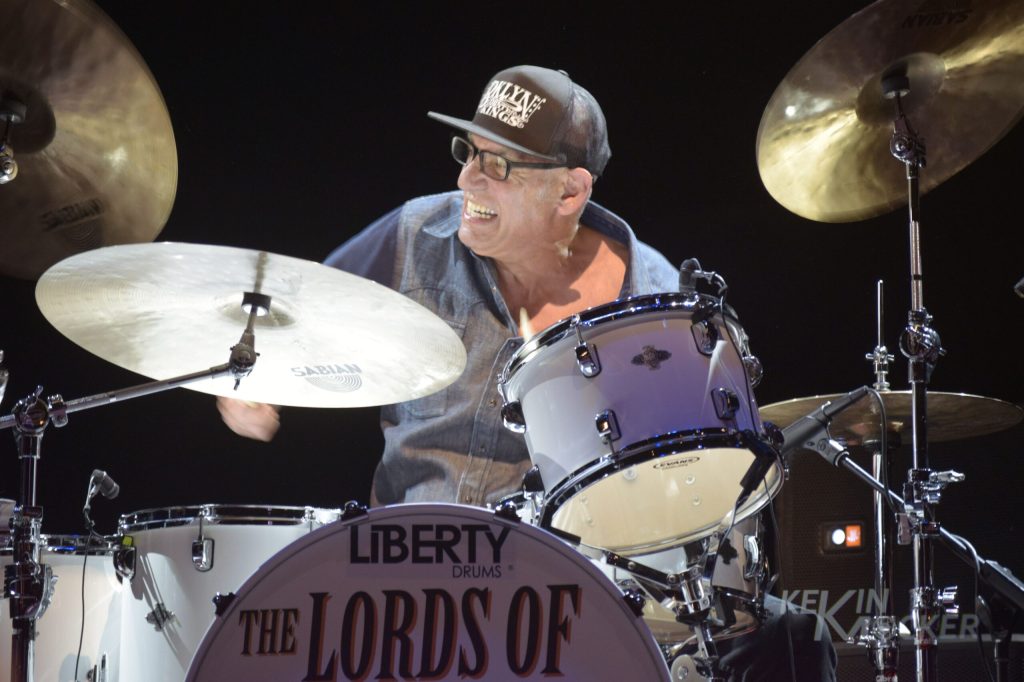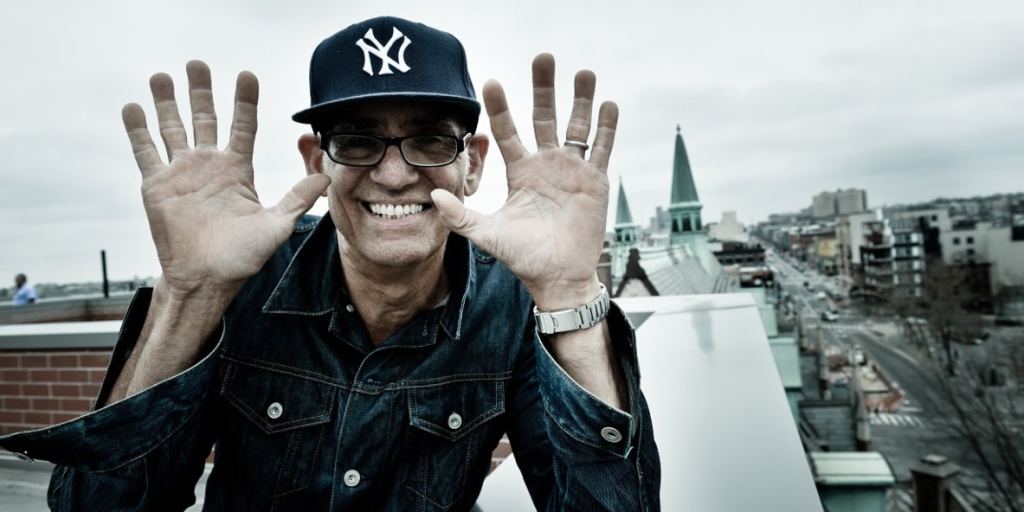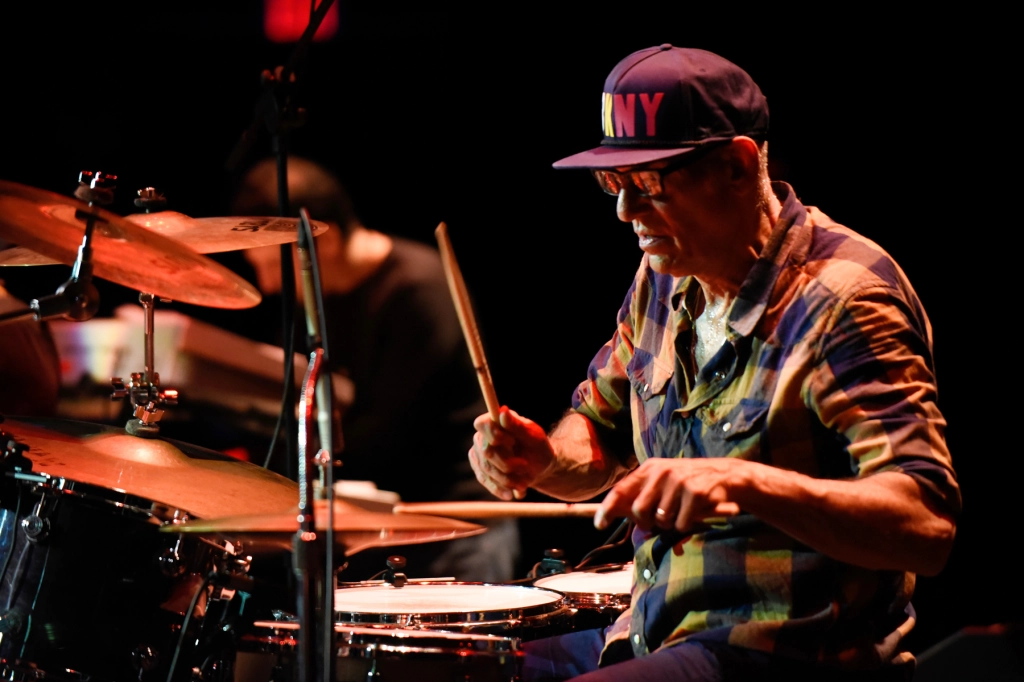All images courtesy of Liberty DeVitto

Growing up on Long Island, you come to learn a few simple truths — we have the best pizza, the best bagels, and Billy Joel‘s music is downright essential.
As a native New Yorker, who grew up, and still resides on Long Island, of course, I am a fan of Billy Joel. That said, I am also a drummer, and when it comes to the music of Billy Joel, I’ve always loved the hard-hitting, yet precise drum work of one Liberty Devitto.
Recently, I had the pleasure of speaking with Liberty DeVitto, who I feel is one of the single most underrated drummers in Classic Rock history. Anyone who enjoys Billy Joel‘s music knows how important Liberty was to Billy’s sound, and since Liberty departed Billy’s band, the music hasn’t sounded quite the same.
So here’s to Billy and Liberty perhaps sharing the stage again one day. In the meantime, check out this interview with Liberty where, among other things, we touch on what he’s been up to during the lockdown, his origins as a drummer, how he got the gig with Billy Joel, working with Meat Loaf, what’s next for The Slim Kings, and a whole lot more.
If you would like to learn more about Liberty DeVitto, you can check out his Facebook page here. Also, be sure to keep tabs on Liberty’s two bands, The Slim Kings, and The Lords of 52nd Street here, and here. Enjoy this interview with Liberty DeVitto. Cheers.
Andrew:
Liberty, I appreciate you taking the time today. How have you been holding up over the last year or so? What have you been up to?
Liberty:
When the pandemic hit, Hudson Music and I were right in the middle of editing my book, Life, Billy, and The Pursuit of Happiness. So, that kept me busy. Before the pandemic hit, my bands the Lords of 52nd Street, and The Slim Kings were constantly playing, but we were shut down overnight. I was also fortunate that an artist from Ohio named Jimmy Hook, who is really a dear friend of mine recorded fifty-four songs in Richie Cannata’s studio, so that was a relief to be able to play. I also did my audiobook in Richie’s studio. That took me fifty-five hours to do. It was a labor of love. So, I stayed pretty busy.
Andrew:
Before we dive into your professional career, let’s go back a bit. What first got you hooked on music?
Liberty:
I’ve always loved music. When I was eight years old, I had a transistor radio that I used to put under my pillow at night, and listen to music. I think it was my first music lesson. Listening was how I learned.
Andrew:
As a drummer, who were some of your early influences?
Liberty:
My mother loves Big Band. She loved Gene Krupa on the drums. He was the first drummer I actually listened to. Then when The Beatles hit, Ringo [Starr] was my guy. That’s when I took to the drums seriously. He was followed by Dino Dinelli, Carmine Appice, and Jim Capaldi from Traffic.

Andrew:
Going back now, take me through how you first met Billy Joel?
Liberty:
I was in a band called The New Rock Workshop. Billy was in a band called The Hassles. We both played at a club called My House in Plainview, Long Island. Sometimes, both bands played on the same night. I would pass Billy in the dark and just say, “Hi.” I was sixteen, he was seventeen.
Andrew:
I believe your first official record as a member of Billy’s band was Turnstiles, in 1976. How did you end up signing on to work with Billy?
Liberty:
When Billy recorded Piano Man and Streetlife Serenade, he was using studio musicians on the records and touring with a different band. He was living in L.A. at the time. Now wanting to move back to New York, he wanted to record with the same band that he would go on the road with, and he wanted a New York-style drummer, which meant an aggressive hard hitter.
Andrew:
For me, from the moment you joined Billy’s band — that is when his sound became truly defined. That group really seemed to have a special chemistry. Can you expand on that more for me?
Liberty:
I got the gig to play on Turnstiles from Doug Stegmeyer, who was already playing on tour with Billy. Myself and Doug along with Russel Javors, and Howard Emerson had a band called Topper. Me, Doug, and Billy went into the studio to record the basic tracks. When Billy listened back he would say, “We could use guitars here.” Doug and I would say, “We know guitar players.” And we brought in Russell and Howard. So, Billy became tight with a unique sound because he had the whole Topper band, who had already been playing for years together.

Andrew:
As far as live records go, many fans will go back and site Songs in the Attic, but I personally feel that Kohliept is the group’s finest moment. You all were really on fire there, and your drumming was absolutely monstrous. Digging a bit deeper, at the time, Rock music wasn’t really gaining ground behind the Iron Curtain, in Soviet Russia, and you all were one of the first Rock groups to perform there, right? Take me through what that experience was like. How much of an impact do you feel you had on those people and their absorption of Rock music at that time?
Liberty:
We were actually the first band to play a full production in the Soviet Union. It was an experience I will never forget. You’ve got to remember, when I was in school, we used to hide under the desk thinking these people were going to drop bombs on us. It was like we went behind the wall, and showed them what it was like living in the Free World for two hours and ten minutes, six shows — three in Moscow, and three in Leningrad.
Andrew:
Billy Joel’s final studio record, River of Dreams is a personal favorite. Going in, did you know that would be Billy’s last studio effort?
Liberty:
Unfortunately, I’m only on one song on the River of Dreams album. The song is called “Shades of Grey.” Nobody knew Billy was about to call it quits.
Andrew:
While Billy ceased making studio albums, he continued to tour, and you were with him up until 2003. Can you take me through what led to your departure?
Liberty:
Billy and I did part ways in 2003. The falling-out consisted of a he said, she said kind of thing. What should’ve happened was he should’ve come to me and said, “Is this true what I’m hearing?” Or, I should’ve stood in his driveway, and stopped him as he was leaving his house one day, and said, “What’s the deal? What’s going on?” But we both are stubborn, so the falling-out lasted fifteen years.

Andrew:
I’ve seen Billy in concert several times, and for me, his music simply isn’t the same without you behind the drumkit. Your power, precision, and swagger were really defining characteristics of that music. With that being said, is there any chance we see you reunite with Billy again in the future? I think that’s something all of his fans would love to see.
Liberty:
That my friend is totally up to Billy.
Andrew:
Looking back, what was your favorite Billy Joel record you’ve performed on, and why?
Liberty:
Each album has a different feel that I love. But I have to say The Nylon Curtain is probably my favorite record. You probably already know that I am a huge fan of The Beatles. I think that on The Nylon Curtain we got the closest to emulating The Beatles.
Andrew:
Beyond Billy Joel, you performed on Meat Loaf’s 1981 record, Dead Ringer, which was a really cool album that a lot of people aren’t so aware of. How did you get the gig with Meat Loaf?
Liberty:
It was a blast to do. If I remember correctly, Meat Loaf came to see us play, and wanted me on one of his records. I eventually got a call from him. He put together a great band. Myself, Davie Johnstone, and Kazam Sultan.

Andrew:
You’ve also recorded with Carly Simon, Bob James, Rick Wakeman, Mick Jones, Karen Carpenter, and most recently, The Slim Kings. What is your favorite record you’ve performed on outside of your work with Billy Joel? What is the current status of The Slim Kings? Anything new on the horizon to report there?
Liberty:
Actually, one of my favorite recordings that I did was with John Hiatt. We did a song called “Snake Charmer” for a movie called White Nights. The Slim Kings have released a new album this year. You can find it on our Facebook page, or our website.
Andrew:
Who are a few of your artists which you like to listen to in your spare time?
Liberty:
For my listening pleasure, I always go back to the 60s. I listen to [Jimi] Hendrix, Cream, Traffic, and of course, The Beatles.
Andrew:
What other passions do you have? How do those passions inform your music, if at all?
Liberty:
I have four daughters. Three of them are in their forties and thirties. One is four and a half. She keeps me young.
Andrew:
Last one. What’s next on your docket? What are you looking forward to most in the post-COVID world?
Liberty:
I can’t wait to get out and play live again. And I think it’s starting to happen.

Interested in sampling the work of Liberty DeVitto and The Slim Kings? Check out the link below:
Dig this interview? Check out the full catalog of VWMusic Interviews, by Andrew Daly, here: www.vinylwritermusic.com/interviews





Leave a Reply